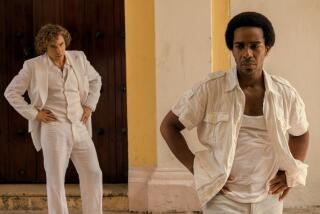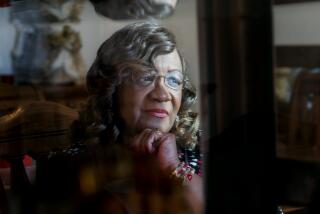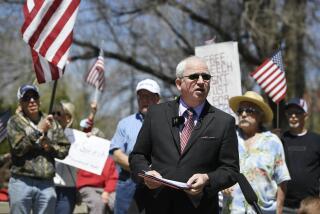Ex-Black Panthers Criticize Negative Depictions of Party : History: Bobby Seale, Eldridge Cleaver tell Cal State Fullerton audience about militancy, civil rights work.
FULLERTON — Members of the Black Panther Party from the 1960s are unfairly characterized as gangsters and thugs, a former leader of the party said Wednesday.
“The Black Panther Party was not a gang,” Bobby Seale, 58, told several hundred students and local residents at Cal State Fullerton. “They grew out of a young black intelligentsia on college campuses.”
Seale, appearing with fellow former party leader Eldridge Cleaver, 59, talked about their part in black militancy and civil rights, the politics of the 1960s and the future of African Americans.
Seale and Cleaver were invited to campus by students as a part of Pan Afrikan Heritage Month at the university, a celebration of African Americans and their accomplishments.
Alexander R. Tijerina and Delia A. Maldonado, Cal State Fullerton seniors and directors of the speakers series, said they decided to invite the pair because they were intrigued with black militants and activists during the 1960s.
The students wanted to honor historical figures among African Americans, Tijerina said, as well as discuss powerful movements for social change in the late 1960s.
Some have argued that the Black Panthers, founded in 1966 by Seale and the late Huey P. Newton, were among several groups who argued that it was impossible to change white racial attitudes and that African Americans should live apart from them. Contrary to more pacifist African American civil rights activists, they advocated that African Americans use violence if necessary to maintain their rights. Newton was shot and killed in 1989 in a drug-plagued area of West Oakland in what the convicted attacker told police was a dispute over crack cocaine.
Seale, alluding to the Black Panthers’ militant image, said the group cooperated with civil rights groups such as the Southern Christian Leadership Conference and more radical groups such as Students for a Democratic Society.
Tijerina said he originally thought that, at the least, most of today’s college students had heard of the Black Panthers. But he found out he was wrong.
“I was talking to students and many never even knew about them,” Tijerina said. “That scared me. I thought, ‘This is a new generation that thinks the ‘60s just meant weird fashion statements.’ ”
Seale, a native Texan, is as known in recent years for his activism, speaking and community organizing. He currently is starting a community program to employ teen-agers and young adults in the renovation of abandoned houses and cars. He wrote a cookbook in 1988.
His first book, in 1970, was titled “Seize the Time.”
“People called me a hoodlum and a thug,” Seale said. “But they didn’t tell you I was a carpenter, an architect, a stand-up comic--even a bartender. And a barbecue cook. But they didn’t tell you that.”
Cleaver, a native of Arkansas, met Seale and Newton in 1967. He became the group’s publicist and pamphleteer. But in 1968, he was involved in a shootout that resulted in the death of group member Bobby Hutton.
He was arrested, jumped bail and fled the country. When he returned in 1975, he announced he had become a Christian.
Pausing Wednesday to reflect on his history with Seale, Cleaver said, “I’m surprised that we’re both still alive, you know,” he said. “I wish Huey were here though.”
More to Read
Sign up for Essential California
The most important California stories and recommendations in your inbox every morning.
You may occasionally receive promotional content from the Los Angeles Times.










